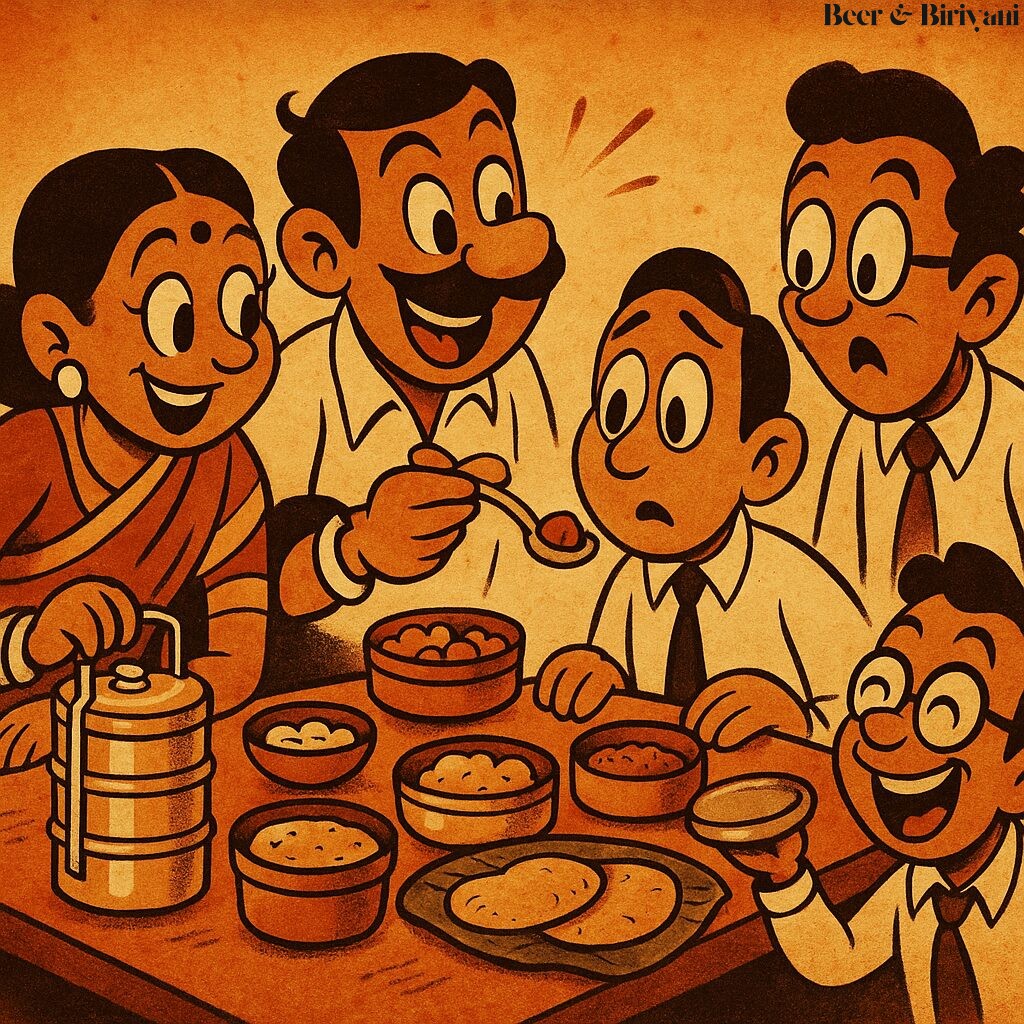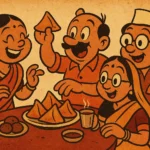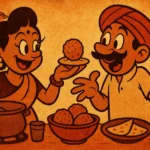My first real job wasn’t glamorous. It involved spreadsheets, shared desks, and air-conditioning that was either absent or arctic. But it had one thing going for it—lunch. Or more specifically, the quiet, beautiful ballet of lunchboxes opened at 1 PM sharp, revealing steaming sabzis, soft rotis, and the beginning of unlikely friendships.
In most Indian offices, the lunch break is less about eating and more about revealing. Not just what’s in your tiffin, but where you’re from, what your mother thinks is “healthy,” and how much you trust your coworkers with your container of chutney. And if you’re lucky, it’s also about diplomacy. Not the kind that involves policy or protocol—but the kind that happens when someone passes you a spoonful of their kootu and suddenly, you’re no longer “the guy from finance.” You’re “the guy who liked my lunch.”
The Table as Neutral Territory
In my first Mumbai office, our lunch table seated six. There was Geeta from Hyderabad, who brought gongura pachadi that could clear sinuses in three states. There was Sameer from Ahmedabad, whose mother packed theplas in ghee-paper that smelled better than perfume. And there was me—armed with my standard-issue Mumbai lunch: chapati, batata bhaji, and the occasional sweet lime pickle, which was really the star of the show.
No one announced it, but the rule was simple: if you sat at the lunch table, you shared. And sharing didn’t mean taking from the main dabba—it meant offering from your heart, and sometimes hiding the good stuff under a layer of rice until someone proved worthy.
The Delicate Art of First Offers
The first week at a new job is tricky. You don’t want to overreach. You wait for someone to say, “Taste this, na.” And then you take just enough to be polite, but not enough to seem greedy. One day, someone tried my shravan bhaji, raised an eyebrow, and asked if I’d put coconut in it. I had. Word spread. By Friday, I was no longer just a junior analyst—I was “the guy whose mom uses coconut in greens.”
It wasn’t long before we had a standing ritual: we’d all open our boxes, do the initial swap, and then begin trading—theplas for idli podi, baingan fry for aloo posto, puliyodarai for kadhi pakora. It was less about preference, more about participation. Like a potluck without planning. Like culinary speed dating, except everyone went home satisfied.
Lunch as Translator
The magic of the office dabba is that it does what HR manuals cannot. It builds fluency across languages and states. You learn to say “thenga” for coconut, “ellu” for sesame, “tikki” for cutlet. You learn that “mild” is a relative term, and that “no onion garlic” doesn’t mean boring—it might just mean there’s ghee somewhere doing God’s work.
In one job, I had a colleague from Kerala who rarely spoke during meetings, but at lunch, he’d explain the precise layering technique of his avial. Another would bring Misal that made grown men cry, then apologize profusely while handing you a second pav. The lunchbox wasn’t just a meal. It was an identity badge, a family tree, a political stance on whether jeera rice counts as effort.
The Unwritten Code
There are unspoken rules, of course. You never take the last gulab jamun unless it’s offered twice. You never open someone’s dabba uninvited. And you always, always return the container clean—preferably with a compliment or a small food-based bribe inside.
The best part? No one keeps score. The guy who brings only curd rice one week might arrive with paneer paratha the next. Someone might eat without offering, not because they’re rude, but because their lunch is humble and they’re shy. That’s okay. The dabba circle forgives. Because everyone knows that someday, you’ll be the one with the surprise kheer.
Lunchboxes Abroad
In Austin, my lunch now smells… noticeable. In shared breakrooms with burritos and quinoa bowls, my methi thepla turns heads. I get questions. “What’s in that?” “Is that curry?” “Can I try?” And slowly, the same diplomacy begins again. One spoonful at a time.
At first, I hesitated. Microwave etiquette here is strict, and the smell of hing doesn’t exactly blend in. But then I remembered—lunchboxes were never about blending in. They were about opening up. So now I pack the thepla. The chutney. Sometimes even the surprise sweet in foil. And I wait for someone to ask. They always do.
The Lunchbox Never Lies
You can fake a resume. You can dress for the job. But your lunch? Your lunch tells the truth. It reveals what comfort looks like for you. What mornings were like in your kitchen. What someone you love packed while you brushed your teeth.
And when you sit at a table with others doing the same—across languages, time zones, spice levels—you realize: this isn’t just a break. This is bridge-building. The dabba is diplomacy. The kind that feeds you first, and changes you quietly after.
Born in Mumbai, now stir-frying feelings in Texas. Writes about food, memory, and the messy magic in between — mostly to stay hungry, sometimes just to stay sane.












